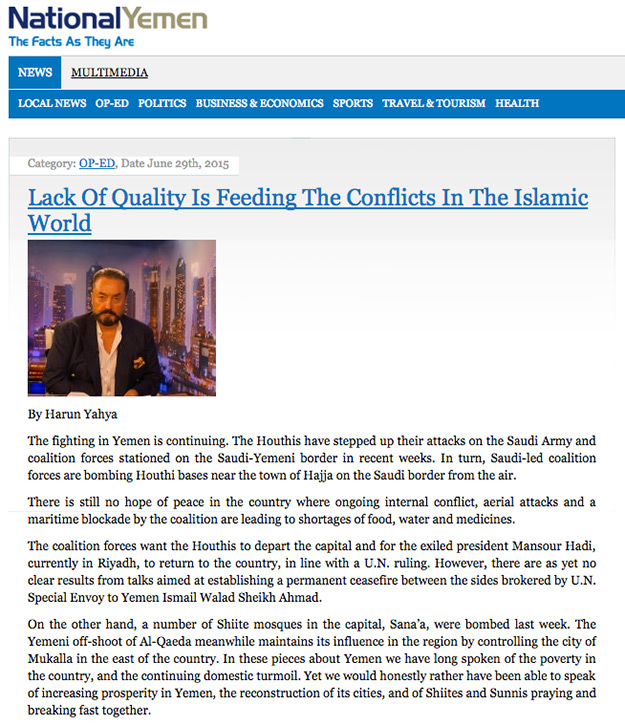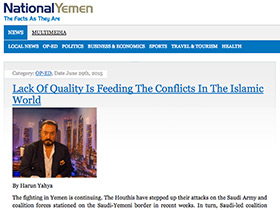
The fighting in Yemen is continuing. The Houthis have stepped up their attacks on the Saudi Army and coalition forces stationed on the Saudi-Yemeni border in recent weeks. In turn, Saudi-led coalition forces are bombing Houthi bases near the town of Hajja on the Saudi border from the air.
There is still no hope of peace in the country where ongoing internal conflict, aerial attacks and a maritime blockade by the coalition are leading to shortages of food, water and medicines.
The coalition forces want the Houthis to depart the capital and for the exiled president Mansour Hadi, currently in Riyadh, to return to the country, in line with a U.N. ruling. However, there are as yet no clear results from talks aimed at establishing a permanent ceasefire between the sides brokered by U.N. Special Envoy to Yemen Ismail Walad Sheikh Ahmad.
On the other hand, a number of Shiite mosques in the capital, Sana’a, were bombed last week. The Yemeni off-shoot of Al-Qaeda meanwhile maintains its influence in the region by controlling the city of Mukalla in the east of the country. In these pieces about Yemen we have long spoken of the poverty in the country, and the continuing domestic turmoil. Yet we would honestly rather have been able to speak of increasing prosperity in Yemen, the reconstruction of its cities, and of Shiites and Sunnis praying and breaking fast together.
Yes, there is a major climate of conflict in Yemen today, meaning that a great many people are living under very harsh conditions. Looking back in time, however, it is very hard to find much to praise in those days either.
Sana’a, Cairo, Baghdad and Aleppo are cities that face the same problems even when there is no fighting. They are dominated by brown dust, pollution, poor infrastructure and poor people. The lands from Afghanistan to Libya have become places where women cannot feel safe to move about freely.
The word “democracy” is much repeated, but there is little sign of it in practice. The unease of today was also caused in those lands by Gaddafi and Saddam in the past. A mindset that believed that anyone who disagreed needed to be killed was dominant. People were sometimes oppressed in the name of politics, sometimes in the name of religion and sometimes for national, ethnic or tribal differences. Freedom of ideas and belief was restricted: Rulers solely sought to impose their own ideologies, beliefs and lifestyles. The ruled, on the other hand, struggled to make a living, mere survival representing their only consolation.
No works of art like those of the past appeared in these lands bereft of mutual understanding. No aesthetic concerns could be seen at all, apart from the palaces of the dictators. For hundreds of years, not a single world-renowned scientist has emerged from those lands.
Yet those lands once led the world in terms of ideas, science and art. One of the sources of that superior civilization was the enthusiastic and determined implementation of the open-mindedness and rationality revealed in the Qur’an.
Members of other faiths and civilizations once greatly admired Muslims. Today’s Muslims need to know about the glorious history of Islamic civilization and they must bear the fervor and responsibility that goes with it.
It is possible to rebuild a splendor similar to that of the past and for Muslims to be at the forefront of both a culture and a civilization that enlightens the world. However, it is of the greatest importance for all such activity in that regard to be done in a spirit of unity and union. If a culture that regards differences with understanding, that uses its power and energy for the benefit of not only Muslims but all mankind and a culture that is conciliatory and peace-loving prevails among Muslims, then the Islamic world can build the greatest civilization of the 21st century. It is the responsibility of us, the Ummah, to turn to the true spirit of Islam and put these grim days behind us, God willing.
Adnan Oktar's piece on National Yemen:
http://nationalyemen.com/2015/06/29/lack-of-quality-is-feeding-the-conflicts-in-the-islamic-world/


